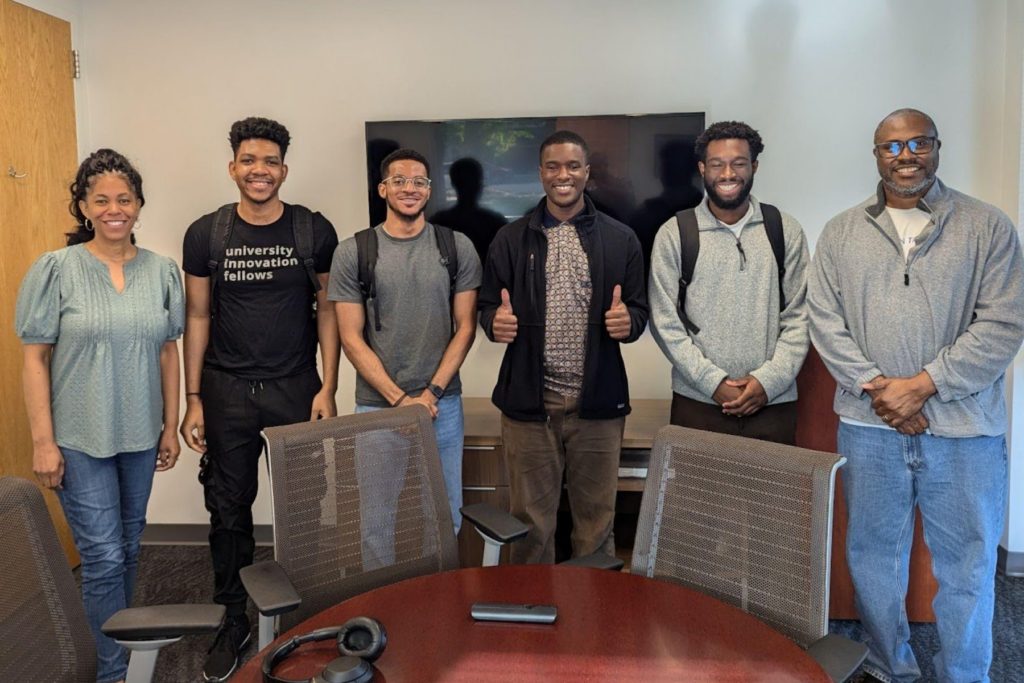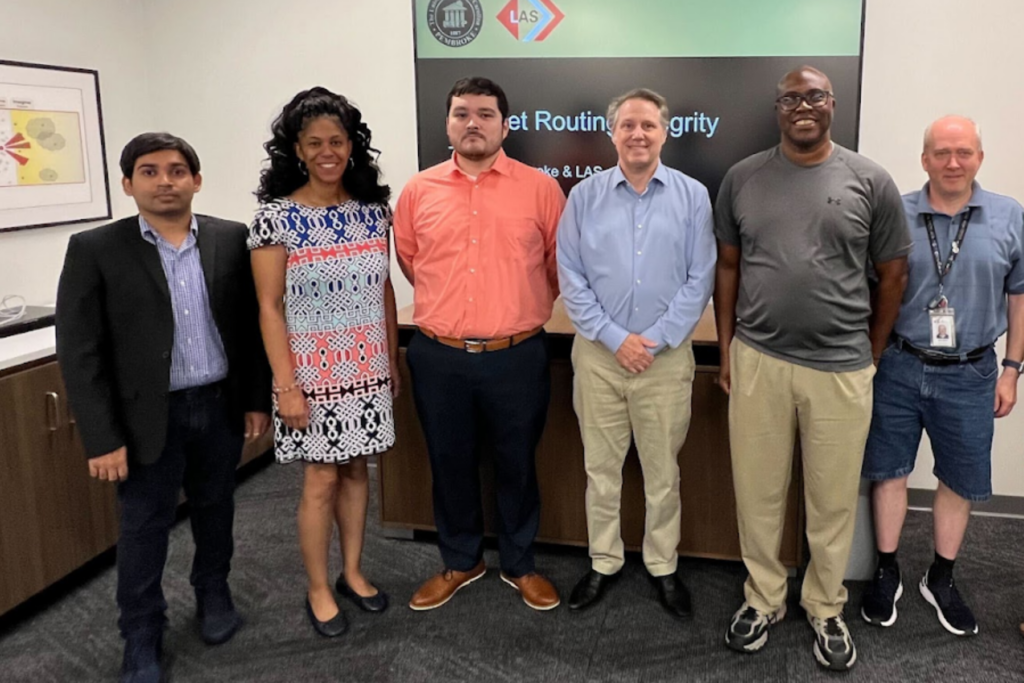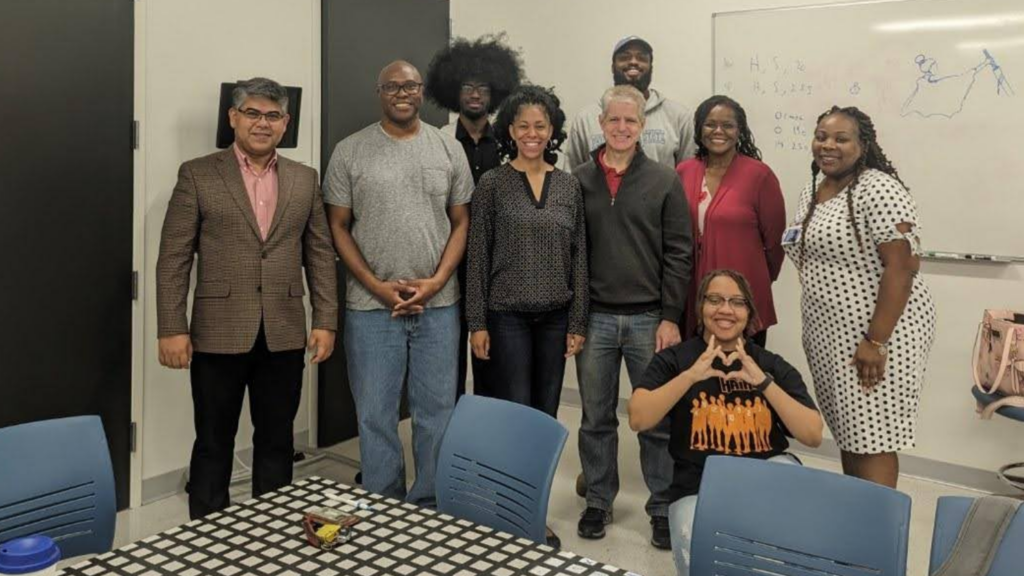Advancing Research and Engagement with Minority Serving Institutions at the Laboratory for Analytic Sciences
LAS: Felecia ML., James S., Donita R.

Objective
Create a process at the Laboratory for Analytic Sciences (LAS) that fosters collaboration with underrepresented minority-serving institutions (MSIs) across North Carolina on research and development projects. This initiative supports one of the NSA’s top priorities: building and sustaining a diverse, highly skilled workforce.
Background
Since opening over a decade ago, the LAS has built strong partnerships with industry and academic researchers across North Carolina. In this journey, the LAS has come to appreciate the unique and impactful research happening at the state’s underrepresented minority-serving institutions (MSIs). These institutions are making meaningful strides in areas that have the potential to impact national security, such as engineering Unmanned Aircraft Systems, advancing Quantum Information Science and Cryptography, Cybersecurity Operations and Defense, and even expanding studies in foreign languages like Chinese and African Studies.
To support these initiatives, the LAS helped establish the Advancing Research Innovating Solutions through Engagement Cooperative Research and Development Agreements (ARISE CRADAs) with at least four MSIs in North Carolina. Through the ARISE CRADA—an initiative launched by the Office of Research and Technology Applications (ORTA)—MSIs now have a formal avenue to collaborate with the NSA on key R&D topics, including the Internet of Things, Cybersecurity, and Secure Composition and System Science.
These partnerships create opportunities for MSI experts to work alongside the NSA on research projects with significant scale and impact. They also help attract diverse talent and skill sets that enrich the NSA workforce. Beyond immediate collaboration, these partnerships bolster research infrastructure and expertise at MSIs, setting the stage for sustained engagement with the NSA over the long term.
As shown in Figure 1, the LAS is centrally located in Raleigh among MSIs in NC. Notably, two MSIs—Elizabeth City State University near Base Elizabeth City and Fayetteville State University near Fort Liberty—are situated near military bases. This proximity is especially valuable, as these institutions have large military student populations, some of whom already hold security clearances, leading to a greater Department of Defense research focus at these MSIs.

The definition of MSIs include Alaska Native and Native Hawaiian Serving Institutions, Asian American and Native American Pacific Islander-Serving Institutions, Hispanic Serving Institutions, Historically Black Colleges and Universities, Predominantly Black Institutions, and Tribal Colleges and Universities.
The 2024 Minority Serving Institution LAS Partnerships
Since 2020, the LAS has built formal partnerships with at least five MSIs in North Carolina, starting with the ARISE CRADA initiative. Through these partnerships, the LAS develops mission-driven research projects tailored for senior design, capstone, and graduate students, with MSI professors co-advising alongside lab researchers. These collaborations not only strengthen ties between the NSA and MSIs but also open up funding opportunities and offer students hands-on experience in impactful projects. By working on real-world challenges, students gain advanced skills and valuable career preparation. Faculty and students alike can engage with real-world mission challenges, sparking interest in ongoing collaboration and potential NSA careers.
The LAS is also identifying MSIs with specialized strengths in key research fields—such as Quantum Information Science, Unmanned Aircraft Systems, Cybersecurity, Data Science, Machine Learning, and Foreign Languages—all crucial to supporting the DOD mission.
Shaw University

In 2024, the LAS forged an exciting new partnership with Shaw University, the first HBCU in the Southern United States and the only college in North Carolina pursuing a Center of Academic Excellence Cyber Operations (CAE-CO) designation. Shaw University joined forces with the LAS on an innovative research project focused on processing information in Exploring the Potential of WebGPU for Near Real-Time Edge Devices using the advanced WebGPU technology. This partnership underscores the LAS’s commitment to pioneering new tech approaches in collaboration with MSIs.
The University of North Carolina at Pembroke

The LAS has strengthened its partnership with the University of North Carolina at Pembroke (UNCP), a Native American Non-Tribal Serving Institution and Center of Academic Excellence in Cyber Defense (CAE-CD), through two significant research projects. The first, Synthetic Cyber Knowledge Graphs (Fall 2023, Spring 2024), focuses on creating synthetic knowledge graphs to represent various cyber scenarios, helping to mitigate sensitivities associated with using real cyber data. This approach enables researchers to develop algorithms capable of detecting malicious behaviors, such as malware attacks. The second initiative, Internet Routing Integrity (2024), centers on developing a system that uses AI and machine learning techniques to visualize the adoption of Resource Public Key Infrastructure by network operators. This advancement aims to enhance the security and resilience of the internet throughout the U.S. At the end of the Fall 2024 semester, UNCP will present the Internet Routing Integrity project to leading internet routing experts at the National Institute of Standards & Technology (NIST). The UNCP will also discuss how their extensive research in Quantum Cryptography might shape the future of internet security in a post-quantum era.
Fayetteville State University

In 2022, the LAS collaborated with Fayetteville State University (FSU), a HBCU located only a few miles from Ft. Liberty, on an innovative senior design project focused on detecting rare or uncommon objects in images and videos. What started as a student project quickly laid the groundwork for deeper collaboration between FSU and the LAS in the field of computer vision analysis. FSU’s research impressed, leading to their selection as a LAS-funded performer for 2023, 2024, and 2025. Through this continued partnership, FSU is advancing its research in rare object detection to support the NSA mission. (Note: FSU has partnered with many entities such as the DoD, IC, NASA and the Dept. of Transportation for North Carolina).
The impact of the collaboration with FSU has extended beyond the LAS. Thanks to this experience and exposure, FSU has officially partnered with external agencies, further enhancing its reputation and research portfolio.
Further, FSU offers a minor in Chinese language and culture that students can combine with a major like computer science, equipping them with a unique skill set that opens doors to a wide range of careers in government, law, technologies and more.
Elizabeth City State University
Looking to the future, the LAS is currently developing a new relationship with Elizabeth City State University (ECSU), a HBCU located close to Elizabeth City Air Base in North Carolina. The LAS plans to leverage ECSU’s expertise in Unmanned Aircraft Systems (UAS). ECSU is the only institution in North Carolina offering a Bachelor of Science in UAS and features a dedicated drone pavilion—a 250 x 100 x 50 outdoor netted facility where students can build and test drones for a range of scenarios. In Spring 2025, the LAS plans to collaborate with ECSU’s senior design students on a research project centered around UAS.
The LAS MSI Outreach Strategy
Through strategic partnerships, the LAS has developed a repeatable outreach model (Figure 2) designed to engage and build lasting relationships with underrepresented MSIs through collaborative research. Central to this model is the use of the ARISE CRADA, which fosters long-term, formal partnerships with MSIs, offers essential resources, and ensures the protection of proprietary information during collaborative R&D efforts. The model also emphasizes devising mutually beneficial research projects and providing ongoing mentorship to students, helping to cultivate a strong pipeline of talent. In-person visits play a vital role in strengthening these relationships, while keeping MSIs informed about various NSA opportunities. Additionally, the outreach model focuses on showcasing student talent and R&D expertise throughout the NSA and Intelligence Community (IC), ensuring continuous collaboration and long-term engagement with MSIs.

Next Steps
Looking ahead, the LAS is deeply committed to expanding its innovative MSI outreach and engagement model across North Carolina. Further, the LAS is excited to explore cutting-edge R&D opportunities that leverage the exceptional expertise within MSIs to advance the NSA mission, such as:
- Cultural Studies and Language initiatives with Fayetteville State University
- Unmanned Aircraft Systems at Elizabeth City State University
- Groundbreaking work in Quantum Information Science and Cryptography through collaborations with The University of North Carolina at Pembroke and Fayetteville State University
- Advanced Cybersecurity Operations development at Shaw University
- Strengthen relationships with all-women institutions in North Carolina (Meredith College, Bennett College, Salem College)
This journey forward represents more than just research partnerships – it’s about recognizing and cultivating the extraordinary talent within North Carolina’s MSIs and women’s institutions. Through these meaningful collaborations, the LAS is creating pathways that will shape the next generation of women and minority leaders in STEM. The LAS vision extends beyond individual projects, it is building a more diverse, equitable, and dynamic scientific community that truly reflects and serves our nation’s defense needs. Together, we’re not just advancing technology – we’re advancing opportunity, innovation, and excellence in service to the nation.
Contact Information
For more information about the MSI outreach and engagement process at the LAS, please contact the LAS Government team below.
- Felecia ML. (fdvega@ncsu.edu)
- James S. (jtsmit23@ncsu.edu)
- Donita R. (drobins7@ncsu.edu)
This material is based upon work done, in whole or in part, in coordination with the Department of Defense (DoD). Any opinions, findings, conclusions, or recommendations expressed in this material are those of the author(s) and do not necessarily reflect the views of the DoD and/or any agency or entity of the United States Government.
- Categories:


